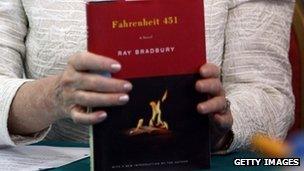Fahrenheit 451 becomes e-book despite author's feelings
- Published

The science fiction novel Fahrenheit 451 has been published as an e-book despite its author's dislike of the format.
Ray Bradbury previously claimed electronic books "smell like burned fuel".
Mr Bradbury's agent said the rights for the author's book had been close to expiring and the publisher had insisted the new contract include e-book rights.
Experts said the news reflected the growing importance of e-formats.
Fahrenheit 451, first published in 1953, describes a dystopian future in which the US has outlawed reading and firemen burn books.
It has sold more than 10 million copies since publication.
'Too many machines'
As late as last year, Mr Bradbury remained firmly opposed to the idea of his book appearing as a digital title.
"I was approached three times during the last year by internet companies wanting to put my books on an electronic reading device," he told the Los Angeles Times in 2010.
"I said to Yahoo: 'Prick up your ears and go to hell.'"
He also complained about the spread of modern technology.
"We have too many cellphones. We've got too many internets. We have got to get rid of those machines. We have too many machines now," he said.
However, Mr Bradbury's agent said the deal had become unavoidable.
"We explained the situation to him that a new contract wouldn't be possible without e-book rights," Michael Congdon said.
"He understood and gave us the right to go ahead."
'A good thing'
The US publisher Simon & Schuster has released Fahrenheit 451 and is selling it at a list price of $9.99 (£6.35).
The company described the e-book as "a rare and wonderful opportunity to continue our relationship with this beloved and canonical author and to bring his works to a new generation of readers".
A spokeswoman for HarperCollins, which publishes Mr Bradbury's books in the UK, said the firm was still in talks with his agent.
Book industry insiders said it was ironic that a science fiction writer should have been so opposed to the idea of electronic reading devices, suggesting strong sales might have changed Mr Bradbury's mind.
"The facts have changed, and so has his opinion," said Neill Denny, editor of the Bookseller magazine.
"My view is good publishing is format-neutral, and so long as publishers control copyright and suppress piracy, then e-books are a good thing for publishers and authors in general.
"However, the e-book is a format that excludes the traditional bookshop and the book trade needs to find a way urgently to support their presence, otherwise there is a danger books drop out of sight permanently for many consumers."
- Published9 November 2011
- Published4 October 2011
- Published28 September 2011
- Published23 June 2011